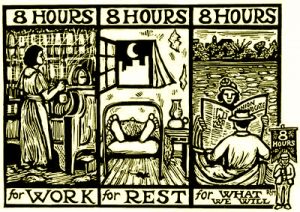Today, Labor Day mostly marks the end of summer celebrated with a long weekend that families spend together. Few know it’s bloody history, or how hard our ancestors fought for the 8-hour work day and safe working conditions we enjoy today.
A brief history of Labor Day:
- In the 19th century the American Industrial Revolution ushered in the age of manufacturing, and brought with it 12- to 16-hour work days, seven days a week, in often unsafe and unsanitary conditions. Factories and mines were at the height production and accepted workers of all ages. At that time, education was not compulsory and for many families, having young children work was necessary. The manufacturing industry dramatically increased, replacing the agricultural sector. Labor unions, which had first appeared in the late 18th century, grew more prominent and vocal, organizing rallies, strikes and protests to reform working hours, pay and safety.
- On August 20, 1866, the newly organized National Labor Union called on Congress to mandate an eight-hour workday. However, the 40-hour work week did not become law until 1940!

Harpers Weekly, May 15, 1886 - There were a number of violent protests by workers in America, but none so well known as the The Haymarket Riot of 1886 which became a symbol of the international struggle for workers’ rights.
- Tennessee joined in the effort on March 11, 1891, when Gov. John P. Buchanan signed an act recognizing “that the first Monday in September of each and every year be set apart as a legal holiday, to be known as Labor Day.”
- 12 years after the Haymarket Riot, on May 11, 1894, employees of the Pullman Palace Car Company in Chicago went on strike to protest wage cuts and the firing of union representatives, which would prove to be a watershed moment in American labor history.
- By the end of 1894, Labor Day had been passed as a Federal holiday to pay tribute to the contributions and achievements of American workers.
- In 1909, the American Federation of Labor convention made a resolution adopting Labor Sunday prior to Labor Day to be celebrated for the labor movement’s educational accomplishments.
Credits: History.com, Wikipedia.com, Tennessee State Library and Archives